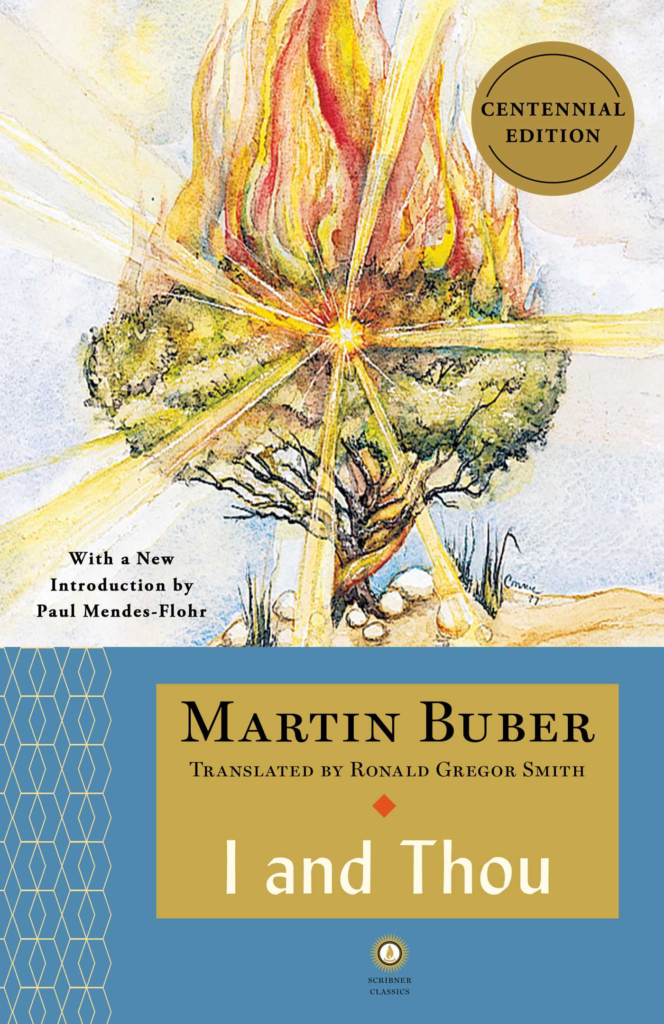I am continuing today with my week long summary and reflection on Martin Buber’s monumental work, I and Thou.
The best way to introduce Buber’s idea in his book I and Thou is with his own words. “To man,” he says, “the world is two-fold in keeping with his two-fold attitude.”[1] These attitudes are represented by two primary, almost primordial, words, which Buber represents in paired pronouns of reference – I-It and I-Thou.
I-It is man’s vision of a world of usable things, the world of means, the world of traceable cause-effect where nature, men, and God are tools for accomplishing personal and public goals and desires.[2] This is the world’s systems, be they economic, social, educational, or otherwise. This is the world of man’s desires and passions, his plans and accomplishments. This is the tangible world of stuff and the intangible world of ideas and assessments. Here men are for pleasure and production, and nature is a resource.[3]
In Part One, Buber does not spend a lot of time explaining I-It, for this word is the one that is most familiar to man. Indeed, it is hard for one to conceive of I-Thou, particularly if he has neglected this aspect of life. In man’s attempt to respond to the expression of I-Thou as it is represented in various terms throughout history, one tends to fall to various aspects of the world of I-It to explain it. I-Thou, however, cannot be sought, only found. It cannot be experienced, only met. Men turn to the world of ideas, and trust the sweetest frames to ward off a sense of nothingness, but I-Thou is not part of the world of ideas,[4] and fictitious sentiment, no matter how warming to the heart, cannot replace the genuineness of I-Thou. It is direct meeting, no foreknowledge, no intervention, no means, no aim, no lust, no anticipation.[5] In the place of meeting, the place of true fellowship of the soul, time and space have no meaning. I-Thou relation takes place in the present, not the present moment passing on to the future, but presence of mind and spirit sustained in the full awareness of the moment and of the meeting, but not past or future.[6] The poetic intangibility of Buber’s initial pass over these matters in Part One bears fruit when he turns to consider the public and private world of men, and the bearing of I-Thou and I-It upon those systems and relations in Part Two.
The I-Thou relation is obtainable for men, says Buber, in three arenas, each with a different essence. One can have I-Thou relations with nature, with men (yes, that includes women too), and with the divine.
With nature, man gets swept away in harmony with, but not necessarily oneness, with creation. There are no words, but it is as if speech were near. Man does not look at a tree and assess its size, shape, color or value, he only reaches out to the tree as part of creation as he is himself a part of creation. It is the eternal creator that stands at the base of this communion.[7] Man cries out that primordial word from his spirit to the tree, “Thou.” It does not cry back.[8]
With man, speech and communication are instrumental in a reciprocal communion of spirits. In this, one cannot look at the man and assess him. His strengths do not enter into the relationship anymore than his weaknesses. He is not valuable, or evaluated, only valued. He is not seen as an object to be manipulated, or appreciated, or appropriated. He is met, and related to in the pure genuineness of the heart as a man. One says to his fellow man, “Thou,” and he replies, “Thou.” They are distinct, but one. Can one look at father or spouse or sibling or neighbor or stranger and not think “experience” and “make use of”? Here is an I-Thou meeting.[9] Here too, the divine eternal Thou, the “Centre,” stands as a foundation for this communion of spirits. Sadly, for Buber, this I-Thou encounter cannot be preserved, it can only pass away and come again.[10] It cannot sustain you in life; one cannot live here; it does, however, allow you a glimpse of eternity.
In these primary words, the I is not the same. A man’s understanding of himself is different in each case. He uses poetic fancy to illustrate the distinction of I with Thou and I with It, in terms of the development of the mind of the child as a microcosm of the evolutionary mind of man. Here, he presents these words as natural and primordial, natural because they are primordial. In Buber’s thinking, I-Thou in primitive man and infants precedes I, and I precedes I-It. Here, humanity is pictured as being in harmony with God and Nature, because he does not contemplate himself as distinct from nature (distinct as an entity yes, distinct in nature, no). He is not bound by systems of earthly cause-effect. Relation is the primary force of existence. As the proverb says, “In the mother’s body, man knows the universe, in birth, he forgets it.”[11] Then man discovers himself, he gains conscious life distinct from other animals. The I is born, and with it comes a separation from all that is around him.[12] He becomes I, and all else becomes It, and like the young charges of Mary Poppins, he forgets the unspoken language of wind and sun and stars. The world comes to be made up of objects to be used, and one’s surroundings are just staging to highlight one’s own life performance.
[1] Buber, 3.
[2] Buber, 6.
[3] Buber, 31-2.
[4] Buber, 13-4.
[5] Buber, 11-2.
[6] Buber, 13.
[7] Buber, 6.
[8] Buber, 124-5.
[9] Buber, 34.
[10] Buber, 17.
[11] Buber, 25.
[12] Buber, 29.
Discover more from Biblical Literacy with Dr. Andrew D. Sargent
Subscribe to get the latest posts sent to your email.



